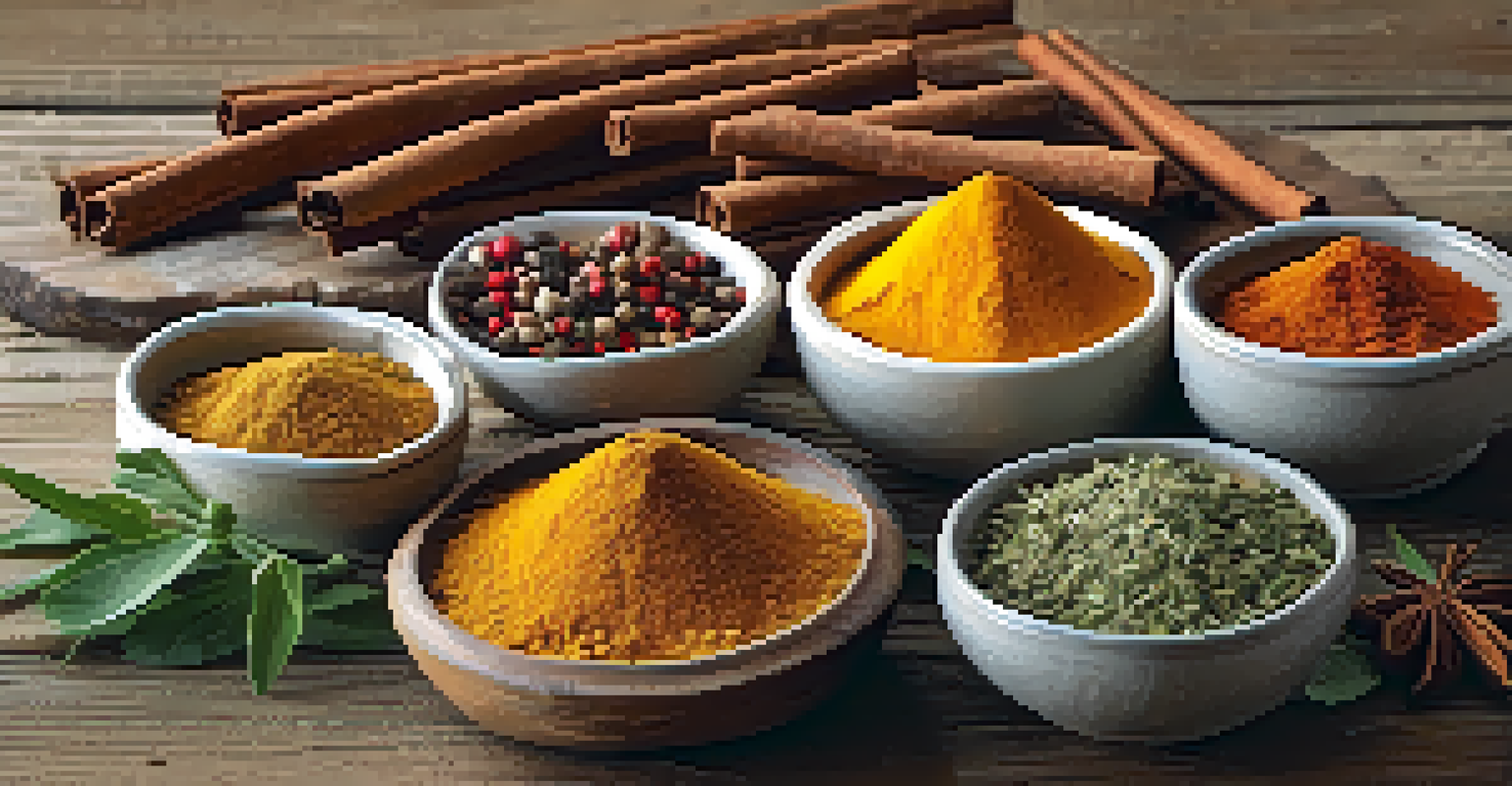The Role of Phytochemicals in Natural Remedies Explained

What Are Phytochemicals and Their Importance?
Phytochemicals are natural compounds found in plants that contribute to their color, flavor, and disease resistance. These compounds are not essential nutrients like vitamins and minerals, but they play a vital role in promoting health. With thousands of phytochemicals identified, they are classified into categories such as flavonoids, carotenoids, and polyphenols, each with unique benefits.
Let food be thy medicine and medicine be thy food.
The importance of phytochemicals lies in their ability to influence health positively. For instance, flavonoids, found in fruits like blueberries and apples, have antioxidant properties that help combat oxidative stress. This stress can lead to chronic diseases, making a diet rich in phytochemicals essential for overall well-being.
Incorporating a variety of phytochemicals into your diet can support immune function, reduce inflammation, and even improve mental clarity. By understanding their roles, we can make informed choices about the foods we consume and harness the power of nature for better health.
How Phytochemicals Work in the Body
Phytochemicals exert their effects through various mechanisms in the body. For example, some phytochemicals act as antioxidants, neutralizing harmful free radicals that can damage cells. Others may enhance the body's detoxification processes, making it easier to eliminate toxins and reduce the risk of disease.

Moreover, certain phytochemicals can influence gene expression, which means they may help regulate how our genes function. For instance, compounds like curcumin found in turmeric have been shown to inhibit pathways that lead to inflammation, promoting a more balanced state in the body. This highlights the connection between diet and gene health.
Phytochemicals Boost Health
These natural compounds in plants enhance health by offering antioxidant properties and supporting immune function.
Understanding how phytochemicals interact with biological systems can empower individuals to make dietary choices that support their health goals. By choosing foods rich in these compounds, we can not only improve our health but also prevent potential diseases.
Phytochemicals in Common Natural Remedies
Many natural remedies leverage the power of phytochemicals to promote healing and wellness. For example, ginger is widely known for its anti-inflammatory properties, thanks to its gingerol content. People often turn to ginger tea for soothing stomach discomfort or easing nausea.
The greatest wealth is health.
Another popular remedy is garlic, which contains allicin, a potent phytochemical known for its antimicrobial and cardiovascular benefits. Consuming raw garlic or garlic supplements can help support heart health and boost the immune system, making it a staple in many households.
These examples illustrate how phytochemicals can be harnessed in everyday remedies. By incorporating these natural options into our routines, we can tap into the therapeutic benefits of plants and enhance our health naturally.
The Role of Antioxidants in Phytochemicals
Antioxidants are a key aspect of many phytochemicals, and they play a crucial role in protecting the body from oxidative stress. Oxidative stress occurs when there's an imbalance between free radicals and antioxidants in the body, leading to cellular damage. Phytochemicals like vitamin C, flavonoids, and carotenoids help combat this imbalance.
For instance, the bright orange pigment in carrots, known as beta-carotene, is a powerful antioxidant that can be converted to vitamin A in the body. This nutrient is essential for maintaining healthy vision, skin, and immune function. Similarly, berries are packed with antioxidants that can reduce inflammation and support heart health.
Role in Disease Prevention
Phytochemicals may lower the risk of chronic diseases like heart disease and diabetes through their beneficial effects on the body.
Incorporating antioxidant-rich foods into your diet is an effective way to harness the protective qualities of phytochemicals. By choosing colorful fruits and vegetables, you can easily boost your antioxidant intake and promote overall health.
Phytochemicals and Chronic Disease Prevention
Research suggests that phytochemicals may play a significant role in preventing chronic diseases such as heart disease, diabetes, and cancer. For example, a diet high in fruits and vegetables, which are rich in phytochemicals, has been linked to a lower risk of cardiovascular issues. Phytochemicals like resveratrol in red wine have been studied for their protective effects on heart health.
In addition to heart health, certain phytochemicals may help regulate blood sugar levels. For instance, the polyphenols found in green tea can enhance insulin sensitivity, making it beneficial for those at risk of diabetes. These findings highlight the importance of including phytochemical-rich foods in our diets.
By understanding the link between phytochemicals and disease prevention, we can make dietary choices that reduce our risk of these conditions. A balanced diet filled with a variety of plant-based foods can serve as a powerful tool for maintaining long-term health.
Incorporating Phytochemicals into Your Diet
Incorporating phytochemicals into your daily diet doesn't have to be complicated. A simple way to start is by adding a variety of colorful fruits and vegetables to your meals. Each color typically represents different phytochemicals, so a rainbow on your plate means a broader range of nutrients.
Herbs and spices are another great way to boost phytochemical intake. Ingredients like turmeric, cinnamon, and oregano not only add flavor but also come packed with beneficial compounds. For instance, using turmeric in your cooking can introduce curcumin, known for its anti-inflammatory properties.
Easy Ways to Include Them
Incorporating a variety of colorful fruits, vegetables, and herbs into your diet can significantly increase your phytochemical intake.
Lastly, consider exploring teas and other beverages that are rich in phytochemicals. Green tea, for instance, is not only refreshing but also loaded with catechins, which have numerous health benefits. By making small changes to your diet, you can easily harness the power of phytochemicals for better health.
The Future of Phytochemicals in Health and Wellness
As research continues to unfold, the future of phytochemicals in health and wellness looks promising. Scientists are increasingly recognizing the potential of these compounds in preventing and treating various health conditions. New studies are exploring their roles in mental health, aging, and even gut health, revealing their multifaceted benefits.
Furthermore, the rise of functional foods—those enhanced with phytochemicals—reflects a growing trend towards healthier eating. Products infused with plant extracts and concentrated phytochemicals are becoming more common, allowing consumers to conveniently access these health benefits. This trend may transform how we approach nutrition and wellness.

In conclusion, the increasing awareness and understanding of phytochemicals may lead to innovative health solutions. By embracing the power of plants and their natural compounds, we can support our health in a more holistic way for years to come.